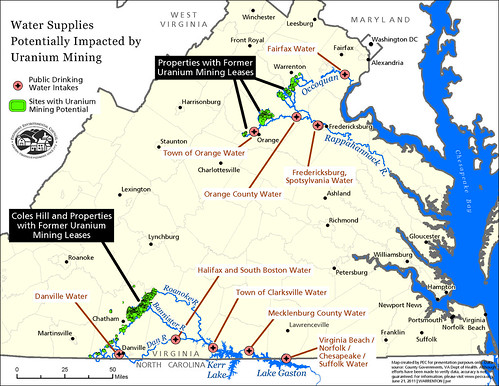The uranium in Virginia will remain safely underground for now, although pressure is still building to overturn Virginia’s ban on mining and milling this radioactive mineral.
Despite a massive lobbying effort by Virginia Uranium, LLC, it appears that efforts to end the ban this year lacked political support, particularly after a National Academy of Sciences study released in December confirmed that uranium mining and milling would expose Virginians to unprecedented risk. On January 20, Gov. Bob McDonnell requested that there be no effort to lift Virginia’s ban on uranium mining this year, but directed state agencies to start drafting regulations for potential uranium mining and milling.
“This is not the time to relax,” says Rob Marmet, PEC’s Senior Energy Policy Analyst. “Although there is no bill to lift the ban this year, Virginia Uranium, Inc. is telling its investors that regulations are being drafted, and legislation will be ready for the 2013 General Assembly session.”
Uranium deposits exist throughout the Commonwealth, and before the ban, which was established in 1982, uranium mining leases were filed on thousands of acres in Culpeper, Fauquier, Madison, and Orange. But uranium has never been mined in Virginia because of the severe risks posed by the state’s high rainfall, intense storms, and natural events such as hurricanes and earthquakes.

In the United States, uranium has only been mined in arid areas, where the low rainfall makes it more feasible to contain the radioactive and toxic mine wastes. Even so, the industry has a bad track record.
The U.S. Environemental Protection Agency has found that tailings from uranium ore have contaminated groundwater in almost every case.
In New Mexico and Arizona, numerous wells have been declared unsafe for drinking, due to radioactive contamination.
In Ontario, more than 30 waste containment dams failed within a 20 year-period, releasing cancer-causing radon into the Serpent River and the Great Lakes.
In Florida, which has dealt with uranium as byproduct of phosphate mining, a mining company went bankrupt, leaving taxpayers to deal with its expensive, toxic legacy.
The National Academy of Sciences study that was released in December confirmed that uranium mining in Virginia would pose health and environmental hazards that are beyond the capacity of current technologies and regulatory expertise to contain.
The study states, “A mine or processing facility could… be subject to uncontrolled releases of radioactive materials as a result of human error or an extreme event such as a flood, fire, or earthquake.”
It further states: ”It is questionable whether currently-engineered tailings repositories could be expected to prevent erosion and surface and groundwater contamination for as long as 1,000 years. Natural events such as hurricanes, earthquakes, intense rainfall, or drought could lead to the release of contaminants if facilities are not designed and constructed to withstand such events, or if they fail to perform as designed.”
PEC has played a leading role in efforts to protect Virginians from the severe public health and environmental risks associated with uranium mining—working to make sure that both lawmakers in Richmond and citizens throughout the state are aware of the potential consequences.
